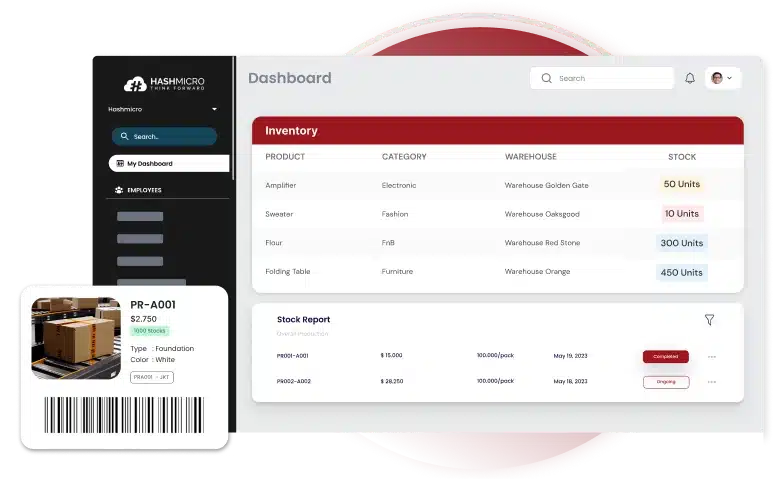Think about your relationship with your inventory optimization. Is it working for you, or are you constantly struggling to strike a balance? Imagine a scenario where you’ve carefully analyzed your stock, only to find you’re still missing the mark either over-ordering and tying up cash or running out at critical moments.
Let’s say you’re managing multiple warehouses, each stocked with products waiting to be shipped. You want to optimize your process, reduce waste, and improve cash flow, but without the right tools, it’s nearly impossible to track everything.
This leads to inefficiencies, missed opportunities, and frustration.
This article will cover the essential steps to improve inventory optimization and avoid common challenges. We’ll look at how real-time tracking, demand forecasting, and automation can help you maintain the right stock levels while minimizing costs.
Key Takeaways
|
Table of Content:
Table of Content
What is Inventory Optimization?
Inventory optimization is the strategic process of managing stock levels to meet demand while minimizing costs. These costs include storage, logistics, and capital tied up in excess inventory. Effective optimization prevents overstocking and shortages, ensuring smooth operations.
A key factor in inventory optimization is leveraging advanced tools for real-time inventory tracking. This enables businesses to monitor stock movements, predict demand accurately, and make data-driven decisions. Using automation and analytics helps balance supply and demand efficiently.
Well-optimized inventory enhances cash flow, reduces logistics costs, and improves operational efficiency. It prevents costly mistakes like over-ordering or running out of key products. Maintaining optimal stock levels boosts profitability and streamlines the entire supply chain.
Key Components of Inventory Optimization
To ensure you always have the right amount of product ready for fulfillment, it’s essential to consider storage capacity, current stock levels, supplier lead times, seasonal trends, and upcoming campaigns.
Here’s a breakdown of the key components in inventory optimization:
1. Demand forecasting
Looking at past data helps estimate how much of each product customers will want. While predicting demand perfectly is impossible, forecasting makes stockouts less likely, keeps customers happy, and ensures inventory is well-managed.
2. Inventory replenishment
Replenishment involves moving items from storage to picking shelves or bringing in more stock from suppliers. Keeping the right amount of inventory ready means you’re prepared to fulfill orders quickly, avoiding backorders and delays that frustrate customers.
3. Inventory levels
Too much stock ties up your money and space, while too little means lost sales and unhappy customers. Optimizing your inventory levels helps you avoid costly mistakes, like high storage fees or running out of popular products.
When stock levels are right, cash flow improves, warehousing runs more efficiently, and customers are more likely to trust your brand.
4. Stock rotation
Stock rotation refers to organizing and using older stock before newer stock to ensure that products don’t sit on shelves too long, which can lead to spoilage, obsolescence inventory, or depreciation.
A proper stock rotation strategy, such as FIFO (First In, First Out), ensures that products are sold in the order they were received, preventing waste and keeping your inventory fresh.
5. Inventory storage
How you store your products is just as important. A good storage setup lets you meet customer demand while giving your business room to grow. Storage needs vary depending on things like sales volume, product type, and shipping locations, so finding a smart approach to storage plays a big role in optimizing your inventory.
Benefits of Inventory Optimization
Optimizing inventory goes beyond just managing stock levels; it impacts your entire business performance. By improving how inventory is handled, businesses can reduce waste, save costs, and enhance efficiency. Let’s explore some key benefits of optimizing your inventory processes.
1. Reduce Operational Costs
A study found that implementing effective inventory optimization strategies led to a 15% reduction in inventory holding costs. This was achieved by identifying the most efficient ways to manage stock levels, helping businesses avoid overstocking and minimizing warehousing expenses.
2. Boost Customer Satisfaction
Research conducted by Procter & Gamble showed that inventory optimization helped reduce stockouts by 25% and improved order fulfillment accuracy by 20%. This means businesses can consistently meet customer demand without delays or shortages, leading to higher customer satisfaction and fewer lost sales.
3. Gain Faster Delivery Options
The same study by Procter & Gamble highlighted a 10% increase in inventory turnover, meaning products are moving faster through the supply chain. By optimizing inventory across different warehouses, companies can strategically position products closer to customers, ensuring faster delivery times.
4. Balance Inventory Levels
A study published in the Archives of Computational Methods in Engineering found that companies using AI for inventory optimization experienced a 30% reduction in excess inventory. This allows businesses to maintain balanced stock levels, ensuring that they don’t overstock or understock items.
5. Prevent Overstocking
The same review from the Archives of Computational Methods in Engineering showed that AI-driven inventory optimization led to a 15% increase in supply chain efficiency. Companies can avoid losses from unsellable inventory by that.
Difference between Inventory Management and Inventory Optimization
Understanding the difference between inventory management and inventory optimization is crucial for effective business operations. While they are closely related, each serves a unique purpose in managing stock. Let’s break down how these two approaches differ and why they matter.
| Aspect | Inventory Management | Inventory Optimization |
| Objective | Ensures productivity and efficiency across all inventory-related operations. | Focuses on maximizing profit margins while minimizing losses. |
| Technology Utilization | Utilizes cloud-based inventory systems, IoT, AI, and automation to enhance supply chain visibility and operational efficiency. | Leverages advanced analytics and forecasting models to align inventory levels with demand fluctuations. |
| Stock Control Approach | Manages overall inventory flow, ensuring stock availability and operational continuity. | Prevents excess stock and shortages by optimizing stock levels to reduce waste and storage costs. |
| Impact on Business | Enhances operational efficiency in production, warehousing, and logistics. | Improves financial performance by reducing unnecessary costs and capturing sales opportunities. |
| Risk Management | Focuses on maintaining stock levels for smooth operations. | Mitigates risks related to overstocking, obsolescence, and demand fluctuations. |
Challenges to Optimizing Inventory Management
Since the existence of supply chains and warehouses, one of the main challenges in achieving inventory optimization has been maintaining the balance between “just enough” and “not too much” inventory.
Traditionally, demand forecasting relied on historical data, and while experts in inventory optimization and demand forecasting are highly skilled, there are limits to what human analysis and prediction can achieve.
Linear supply chains powered by outdated systems remain vulnerable despite the level of expertise involved. Some of the most common challenges faced include:
- Outdated systems unable to manage or process large data sets: Manual and disconnected technologies struggle to handle the massive amounts of varied and unstructured data. The greatest accuracy in risk prediction and demand forecasting comes from applying smart technologies such as AI, machine learning, and advanced analytics to this data.
- Rapidly changing customer demands: Each year, consumers increasingly expect faster delivery and more personalized products. Additionally, product lifecycles are becoming shorter. Meeting these demands can be costly for companies, pushing the need for more precise inventory optimization strategies.
- Rising competition: With Industry 4.0 and connected supply chain technologies, businesses can scale and expand faster than ever before, often managed from a single central platform. This has significantly increased competition and consumer options, driving businesses to seek inventory optimization solutions to gain a competitive advantage.
- Weather events and natural disasters: More frequent severe storms and wildfires pose challenges to supply chains. While it’s impossible to predict such events accurately, advanced analytics and cloud-based solutions offer inventory managers better tools to respond effectively to fluctuating demand in the aftermath of these disruptions.
Best Practices of Inventory Optimization
Inventory optimization involves more than just accurately predicting demand. To fully optimize your inventory, your team needs to rethink how stock is stored, ordered, and managed, re-evaluate key metrics, anticipate seasonal trends, and refine the overall inventory management approach.
Here’s a step-by-step guide to optimizing inventory levels for your business:
1. Master Demand Forecasting
The first and most essential step to inventory optimization is accurate demand forecasting. Your business must know exactly what it needs to keep in stock.
Select a forecasting model that suits your industry and incorporates both historical inventory trends and future demand projections. It might be helpful to consult an expert to improve accuracy.
If you use inventory management software, leverage historical data to predict future inventory requirements.
2. Create a Standardized Inventory Management Plan
Without a unified and consistent approach to managing inventory, efforts to optimize levels won’t succeed.
Choose a system that works for your team, whether it’s a manual inventory list, spreadsheet, or inventory management app. Apps tend to be more efficient for teams, offering better usability across different locations and features of inventory management that can speed up the inventory process.
Once you’ve selected your method, establish a standard operating procedure (SOP) outlining the key processes, including:
- Ordering inventory
- Receiving and checking in inventory
- Storing and moving inventory
- Tracking sales, consumption, or usage
- Auditing and accounting for stock
By focusing on all aspects of inventory management, not just maintaining the correct stock levels, your business can optimize its overall approach.
3. Oversee Inventory from Arrival to Use
With a solid system in place, you’ll need to track each item from when it arrives to when it is sold, consumed, or used in production.
If physical inventory tracking seems overwhelming, consider using an inventory app that features barcode or QR code scanning, allowing your team to track inventory more efficiently and reduce errors.
4. Track SKUs Effectively
Syncing your SKUs with an inventory management solution allows for easy tracking, updating, and managing of products across your distribution network and sales channels. This helps avoid overselling or running out of stock prematurely.
With an integrated system, you can:
- Monitor real-time inventory levels for each SKU
- Set reorder points to receive alerts when stock levels are low
- Bundle multiple SKUs for promotions
- Consolidate the same product across different sales platforms
- Prepare and assemble SKUs before shipping
By efficiently managing SKUs, your business can maintain optimal stock levels and streamline the overall inventory process.
5. Monitor Supplier Performance
In addition to watching demand, it’s important to assess supplier reliability. Factors like weather, trends, and shipping delays can affect their ability to deliver.
Identify suppliers who fail to meet deadlines or provide damaged or substandard stock. If these issues persist and affect your optimization efforts, it may be time to switch to more reliable vendors.
In order to make inventory reconciliation faster, smoother, and more accurate, the use of inventory management software would help immensely. This system also helps you to present detailed inventory movement report.
Better yet, an inventory system that’s completely tailored to the companies’ needs, so that they don’t need to adjust their workflows around the system. Click on the pricing calculator banner below to get your customized quote based on what you need.
Make Inventory Optimization Effortless with Inventory Software
Managing inventory is a balancing act—maintaining stock levels, predicting demand, and ensuring smooth supply chain operations. It’s not just about avoiding stockouts or reducing excess but creating a system that aligns with your business needs.
HashMicro Inventory Management Software goes beyond tracking stock. It automates replenishment, sets smart reorder points, and provides real-time visibility into your supply chain.
Designed to integrate seamlessly with your processes, it simplifies demand forecasting and supplier management.
HashMicro offers powerful features to optimize your inventory:
- Vendor Portal: An automated vendor portal simplifies order and payment management, ensuring a seamless procurement process. By streamlining operations, orders are fulfilled faster, preventing both stock shortages and overstocking.
- OCR for RFQ Processing: Optical Character Recognition (OCR) technology converts physical RFQs into digital data, reducing manual entry errors and expediting order processing. This enhances accuracy and efficiency in stock replenishment.
- Automated Vendor Rating and Reviews: An automatic rating system evaluates vendors based on delivery timeliness, pricing, and service quality, ensuring consistent reliability. Regular performance reviews further enhance supplier accountability, leading to smoother inventory management.
- Cost and Budget Control: Tracking procurement savings provides insights into vendor cost-effectiveness, allowing businesses to prioritize suppliers that offer optimal value. Additionally, budget tracking and purchase limits help regulate spending, ensuring financial stability while maintaining appropriate stock levels.
These features work together to give you better control over your inventory, making it easier to manage stock levels, improve supplier performance, and stay within budget. All of which are key to optimizing your inventory process.
Conclusion
Inventory optimization balances stock levels to meet customer demand while minimizing holding costs. It involves accurate demand forecasting, real-time tracking, and efficient supplier management to avoid stockouts or overstocking.
HashMicro Inventory Software offers a solid, all-in-one solution to optimize inventory management effortlessly. There is no need to stress over stock anymore; its automation tools help you track stock in real time, streamline supplier interactions, and automate replenishment processes.
By choosing HashMicro, your business will save time, cut costs, and boost operational efficiency. Everything will be chio and well-organized, with advanced analytics, automatic vendor rating, and budget tracking to keep you in control.
Try out the free demo and take your inventory management to the next level, confirm can one!
FAQ about Inventory Management Software
-
-
How does inventory optimization differ from traditional inventory management?
Traditional inventory management focuses on tracking stock levels and ensuring availability, while inventory optimization takes a strategic approach to balancing supply and demand. Optimization aims to minimize holding costs, reduce waste, and improve profitability by leveraging data-driven insights and automation.
-
What role does technology play in inventory optimization?
Technology, including AI, machine learning, and real-time inventory tracking, helps businesses analyse demand patterns, automate replenishment, and optimize stock levels. These tools enhance accuracy, reduce human errors, and improve overall efficiency in managing inventory.
-
How can inventory optimization improve cash flow?
By maintaining optimal stock levels, businesses avoid tying up excess capital in unsold inventory. This ensures better cash flow management, allowing companies to allocate resources effectively while preventing overstocking or stockouts that can impact revenue.
-



























































